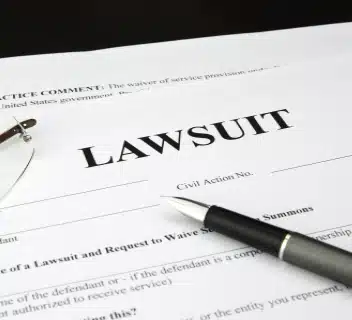Breach of Written Contract Statute of Limitations in California
If you’re dealing with a broken agreement, one of the first questions that comes up is about deadlines: how long do you have to file a lawsuit? In California, the rules are specific, and understanding them is critical. In California, the statute of limitations for a breach of written contract is four years, with California statutes providing the legal basis for these deadlines, but the details can be more complex. Calculating the exact deadline or determining if an exception applies can be complicated.
Knowing your rights and deadlines is crucial because missing them could mean losing your claim entirely. If a lawsuit is filed after the deadline, the court may dismiss the case. Statutes of limitations are intended to promote the timely resolution of disputes. In this article, we’ll explain what a breach of contract is, how liability works, and why the breach of written contract statute of limitations California plays such an important role in protecting your legal rights.
What Is a Breach of Contract, Exactly?
A breach of contract occurs when one party fails to perform their obligations under an agreement. Contracts can be written, oral, or implied, and each type has different enforceability rules. For written contracts, it is important that all parties sign the agreement for it to be legally enforceable. The rules for contract enforcement, including deadlines and procedures, are governed by the California Code of Civil Procedure.
Examples of Breach of Contract:
- Failure to Deliver Goods: A supplier fails to provide materials as promised.
- Failure to Pay: A client refuses to pay for services provided.
- Failure to Complete Services: A contractor abandons a project midway.
- Violation of Specific Terms: Such as breaching a confidentiality clause.
In California, courts take breaches seriously, but deadlines matter. The breach of written contract statute of limitations California sets the outer time limit for bringing these disputes into court.
How Do I Know Whether I Have an Actionable Legal Claim for a Breach of Contract?
To pursue damages, a plaintiff must have a legal reason to bring a breach of contract claim and must establish several elements:
- Existence of a Contract: The plaintiff must prove a valid agreement.
- Performance: The plaintiff performed their side of the deal.
- Breach: The other party failed to do what they promised.
- Damages: The plaintiff suffered losses because of the breach.
These requirements apply when filing a lawsuit for breach of contract, which is a type of civil action.
Example Scenarios:
- A business partner fails to deliver promised investment funds.
- A landlord breaches a lease by refusing agreed-upon repairs.
If you meet these conditions, you can file a lawsuit—assuming you do so within the breach of written contract statute of limitations California.
Does It Matter Whether My Contract Was Written or Oral? Can I Still Sue If I Had an Oral Contract?
Yes, it matters. The statute of limitations differs depending on whether the agreement was written or oral, and different laws set the statutes of limitations for each type.
- Written Contracts: 4 years under the breach of written contract statute of limitations California.
- Oral Contracts: 2 years to bring a claim.
Written contracts are easier to prove because the terms are clearly documented. But don’t be discouraged if your agreement was oral—California law still recognizes oral contracts as enforceable.
These statutes of limitations laws apply to civil cases involving contract disputes.
Example:
If you hired a contractor orally and they failed to finish the work, you could still file a lawsuit, though your deadline would be shorter than the breach of written contract statute of limitations California.
What Steps Should I Take After a Breach of Contract Incident?

If you think you’ve been the victim of a breach, be aware of your rights and obligations, including any deadlines or requirements for action. Here’s what you should do:
- Gather the Contract: Locate your written agreement and review the terms.
- Document the Breach: Collect emails, letters, and invoices.
- Communicate in Writing: Notify the other party of the breach and give them an opportunity to respond in writing.
- Mitigate Damages: Take reasonable steps to reduce losses.
- Consult an Attorney: An attorney can advise whether the breach of written contract statute of limitations California applies and how much time you have left.
Collecting Evidence and Documentation
When preparing to file a breach of contract lawsuit in California, collecting comprehensive evidence and documentation is one of the most important steps you can take to support your legal claim. Whether your dispute involves a written contract or an oral contract, the strength of your case often depends on the quality and organization of your evidence.
Start by gathering the contract or agreement at the center of your dispute. For written contracts, this means locating the signed document and any amendments or addenda. If your agreement was based on an oral contract, compile any supporting materials that show the existence and terms of the agreement—such as emails, text messages, or notes from meetings.
In addition to the contract itself, collect all communication records between you and the other party. This includes emails, letters, text messages, and even notes from phone calls. These records can help establish what was agreed upon, how the breach occurred, and how both parties responded. Invoices, payment receipts, and records of services or goods delivered are also crucial, as they help prove performance and damages.
If the breach of contract resulted in property damage, personal injury, or wrongful death, be sure to gather all relevant evidence, such as photographs, repair estimates, medical records, and bills. In cases involving a government agency or contractor, you may need to follow specific procedures for filing your claim, so it’s important to keep copies of all correspondence and submissions.
California courts require plaintiffs to prove their claims with clear evidence. This means you must be able to show not only that a contract existed and was breached, but also the harm you suffered as a result. The defendant may raise an affirmative defense, such as arguing that the statute of limitations has expired, so it’s essential to have documentation showing when the breach occurred and when you discovered it—especially if the delayed discovery rule might apply in your circumstances.
Be meticulous in your documentation. Keep a timeline of events, save all relevant documents, and organize your evidence so it’s easy to present in court. If you’re unsure about what to collect or how to proceed, consult a lawyer experienced in California contract law. An attorney can help you understand the applicable statutes, ensure you meet all filing requirements, and guide you through the civil procedure process.
Remember, the limitations period for filing a breach of contract lawsuit in California is generally four years for written contracts and two years for oral contracts. Missing these deadlines can result in your case being dismissed, regardless of the merits. By acting promptly, collecting thorough evidence, and seeking legal advice, you can protect your rights and improve your chances of a successful outcome in your breach of contract claim.
Why Do Most Cases End in Settlement?
Court trials are rare in breach of contract disputes because settlements are faster, less costly, and more predictable. Many parties prefer to settle rather than face the uncertainty and expense of suing and engaging in legal proceedings as an alternative to settlement.
Reasons for Settlement:
- Cost of Litigation: Trials are expensive.
- Time: Cases can take years to resolve.
- Certainty: Settlements eliminate trial risk.
- Privacy: Settlements often remain confidential.
The looming deadline set by the breach of written contract statute of limitations California also pressures parties to negotiate earlier.
What Factors Influence a Settlement?
- Strength of Evidence: A strong paper trail pushes settlements higher.
- Size of Damages: Larger losses can drive faster settlements.
- Risk of Trial Loss: Defendants may settle to avoid high judgments.
- Deadlines: The breach of written contract statute of limitations California creates urgency.
How Much Compensation Am I Entitled to Receive for My Breach of Contract?

Damages in contract law are designed to put the injured party in the position they would have been if the contract had been performed. Damages may include compensation for loss or damage to personal property. The calculation of damages is typically based on the date the contract was broken or the date the loss occurred.
Different legal claims have different statutes of limitations. For example, certain property damage or medical malpractice claims may have their own deadlines separate from contract law.
Types of Damages:
- Compensatory Damages: Cover actual losses.
- Consequential Damages: Cover losses indirectly caused by the breach.
- Liquidated Damages: Pre-agreed amounts stated in the contract.
- Specific Performance: Court orders breaching party to perform.
Example:
If a vendor fails to deliver parts, forcing you to buy replacements at a higher cost, you may recover the price difference.
Understanding the statute of limitations helps preserve your right to seek damages if your case is viable.
How Much Time Do I Have to Pursue My Breach of Contract Claims in California?
This is the most critical section. The breach of written contract statute of limitations California is 4 years, meaning you must file a lawsuit within the time limits set by the statutes of limitations after the breach occurs. Determining when the limitation period begins can be complicated and depends on the facts of each case. The limitation period may be tolled or extended under certain circumstances, such as when the plaintiff is a minor—the statute of limitations is tolled until the minor turns 18. The statutes of limitations are designed to ensure claims are filed promptly. Time limits for filing may also be extended by agreement or by law. In some cases, the statute of limitations may be tolled until the plaintiff discovers the breach or injury, or until the plaintiff knew or should have known about it with reasonable diligence.
Exceptions and Extensions:
- Tolling for Fraud or Concealment: If the breach was hidden, the clock may not start until discovering the injury or breach.
- Continuous Contracts: If performance was ongoing, the deadline may begin at the end of the contract.
- Bankruptcy Tolling: Filing bankruptcy may extend deadlines.
Medical malpractice claims often have different statutes of limitations and specific discovery rules that may affect when the time to file begins.
Oral Contracts:
Remember, oral contracts only have 2 years under California law. This is half the time of the breach of written contract statute of limitations California.
5-Year Statute of Limitations California:
Common statutes of limitations for civil claims in California include 2 years for personal injury, 4 years for written contracts, and 5 years for certain real estate or judgment enforcement actions, with special rules for government-related cases.
While most written contract claims fall under 4 years, some cases—like certain real estate or judgment enforcement actions—may involve the 5-year statute of limitations California. Understanding which deadline applies to your situation is critical.
How Do I Know Whether California Law Will Apply to My Contract Dispute?
Several factors determine whether California law governs:
- Choice of Law Clauses: Contracts may specify which state law applies.
- Location of the Parties: If both parties are in California, it likely applies.
- Place of Performance: If the work was to be done in California, state law likely applies.
An attorney can help determine if the breach of written contract statute of limitations California governs your claim. Legal practice in California requires familiarity with state-specific statutes of limitations to ensure compliance and effective representation.
What Can an Attorney Do to Help With My Breach of Contract Claims?
A lawyer can handle civil actions involving breach of contract and:
- Review Your Contract: Clarify your rights and obligations.
- Calculate Damages: Assess the full scope of losses and determine the relevant date from which the statute of limitations begins to run.
- Negotiate Settlements: Push for favorable resolution.
- File Lawsuits: Ensure compliance with the breach of written contract statute of limitations California.
- Represent You in Court: Advocate on your behalf.
Attorneys also help identify if exceptions, such as the 5-year statute of limitations California, apply to your case.
Contact 1-800-THE-LAW2 for a Free Consultation
If you’ve experienced a breach of contract, don’t wait. If your lawsuit is not filed within the statutes of limitations, the court may dismiss your case, and missing the deadline could end your case before it begins. Even if you’re unsure whether your contract is enforceable, you should act quickly to protect your rights.
Contact 1-800-THE-LAW2 today for a free consultation with an attorney in our network. Free consultation does not include court costs or expenses. An experienced attorney in our network can review your agreement, explain your options, and advise you about the statute of limitations. Don’t risk losing your claim—get help now.




